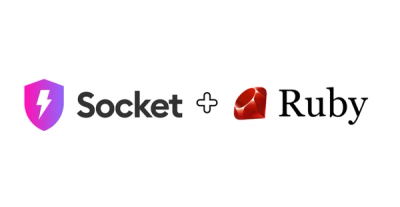
Product
Rubygems Ecosystem Support Now Generally Available
Socket's Rubygems ecosystem support is moving from beta to GA, featuring enhanced security scanning to detect supply chain threats beyond traditional CVEs in your Ruby dependencies.
@sentry/svelte
Advanced tools
This SDK currently only supports Svelte apps in the browser. If you're using SvelteKit, we recommend using our dedicated Sentry SvelteKit SDK.
This package is a wrapper around @sentry/browser, providing error monitoring and basic performance monitoring features
for Svelte.
To use the SDK, initialize Sentry in your Svelte entry point main.js before you bootstrap your Svelte app:
// main.js / main.ts
import App from './App.svelte';
import * as Sentry from '@sentry/svelte';
// Initialize the Sentry SDK here
Sentry.init({
dsn: '__DSN__',
release: 'my-project-name@2.3.12',
integrations: [Sentry.browserTracingIntegration()],
// Set tracesSampleRate to 1.0 to capture 100%
// of transactions for performance monitoring.
// We recommend adjusting this value in production
tracesSampleRate: 1.0,
});
// Then bootstrap your Svelte app
const app = new App({
target: document.getElementById('app'),
});
export default app;
The Sentry Svelte SDK supports all features from the @sentry/browser SDK. Until it becomes more stable, please refer
to the Sentry Browser SDK documentation for more information and usage
instructions.
To generate source maps of your Svelte app bundle, check our guide how to configure your bundler to emit source maps.
To create releases and upload source maps to
Sentry, we recommend using sentry-cli. You can for instance create a bash
script to take care of creating a release, uploading source maps and finalizing the release:
#!/bin/bash
VERSION=<your version>
ORG=<your org-slug>
PROJECT=<your project-slug>
SOURCEMAPS_PATH=./dist
sentry-cli releases new $VERSION --org $ORG --project $PROJECT
sentry-cli releases files $VERSION upload-sourcemaps $SOURCEMAPS_PATH --org $ORG --project $PROJECT
sentry-cli releases finalize $VERSION --org $ORG --project $PROJECT
Please note that the paths provided in this example work for a typical Svelte project that adheres to the project
structure set by create-vite with the svelte(-ts) template. If your
project setup differs from this template, your configuration may need adjustments. Please refer to our documentation of
Advanced sentry-cli Sourcemaps Options and to
our Sourcemaps Troubleshooting Guide.
Check out our Svelte source maps uploading guide for more information.
9.10.0
feat: Add support for logs
beforeSendLog (#15814)All JavaScript SDKs other than @sentry/cloudflare and @sentry/deno now support sending logs via dedicated methods as part of Sentry's upcoming logging product.
Logging is gated by an experimental option, _experiments.enableLogs.
Sentry.init({
dsn: 'PUBLIC_DSN',
// `enableLogs` must be set to true to use the logging features
_experiments: { enableLogs: true },
});
const { trace, debug, info, warn, error, fatal, fmt } = Sentry.logger;
trace('Starting database connection', { database: 'users' });
debug('Cache miss for user', { userId: 123 });
error('Failed to process payment', { orderId: 'order_123', amount: 99.99 });
fatal('Database connection pool exhausted', { database: 'users', activeConnections: 100 });
// Structured logging via the `fmt` helper function. When you use `fmt`, the string template and parameters are sent separately so they can be queried independently in Sentry.
info(fmt(`Updated profile for user ${userId}`));
warn(fmt(`Rate limit approaching for endpoint ${endpoint}. Requests: ${requests}, Limit: ${limit}`));
With server-side SDKs like @sentry/node, @sentry/bun or server-side of @sentry/nextjs or @sentry/sveltekit, you can do structured logging without needing the fmt helper function.
const { info, warn } = Sentry.logger;
info('User %s logged in successfully', [123]);
warn('Failed to load user %s data', [123], { errorCode: 404 });
To filter logs, or update them before they are sent to Sentry, you can use the _experiments.beforeSendLog option.
feat(browser): Add diagnoseSdkConnectivity() function to programmatically detect possible connectivity issues (#15821)
The diagnoseSdkConnectivity() function can be used to programmatically detect possible connectivity issues with the Sentry SDK.
const result = await Sentry.diagnoseSdkConnectivity();
The result will be an object with the following properties:
"no-client-active": There was no active client when the function was called. This possibly means that the SDK was not initialized yet."sentry-unreachable": The Sentry SaaS servers were not reachable. This likely means that there is an ad blocker active on the page or that there are other connection issues.undefined: The SDK is working as expected.SDK Tracing Performance Improvements for Node SDKs
dropUndefinedKeys (#15796)dropUndefinedKeys for spanToJSON calls (#15792)SentryError for PromiseBuffer control flow (#15822)dropUndefinedKeys in SpanExporter (#15794)SentryError for event processing control flow (#15823)dropUndefinedKeys in Node SDK init (#15797)We've been hard at work making performance improvements to the Sentry Node SDKs (@sentry/node, @sentry/aws-serverless, @sentry/nestjs, etc.). We've seen that upgrading from 9.7.0 to 9.10.0 leads to 30-40% improvement in request latency for HTTP web-server applications that use tracing with high sample rates. Non web-server applications and non-tracing applications will see smaller improvements.
FAQs
Official Sentry SDK for Svelte
We found that @sentry/svelte demonstrated a healthy version release cadence and project activity because the last version was released less than a year ago. It has 10 open source maintainers collaborating on the project.
Did you know?

Socket for GitHub automatically highlights issues in each pull request and monitors the health of all your open source dependencies. Discover the contents of your packages and block harmful activity before you install or update your dependencies.

Product
Socket's Rubygems ecosystem support is moving from beta to GA, featuring enhanced security scanning to detect supply chain threats beyond traditional CVEs in your Ruby dependencies.

Research
The Socket Research Team investigates a malicious npm package that appears to be an Advcash integration but triggers a reverse shell during payment success, targeting servers handling transactions.

Security Fundamentals
The Socket Threat Research Team uncovers how threat actors weaponize shell techniques across npm, PyPI, and Go ecosystems to maintain persistence and exfiltrate data.